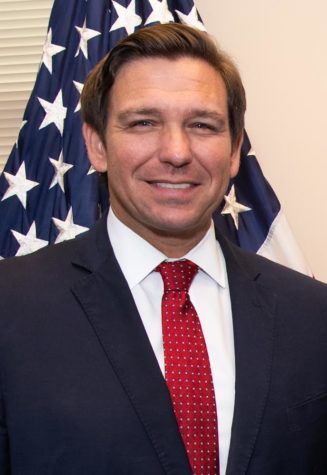How Did Disney Get Tangled Up With Ron DeSantis?
Is the squabble part of a noble fight for LGBTQ equality, or simply a power game between a corrupt politician and an equally corrupt corporation?
As much as Disney has wanted to brand itself as apolitical in the past, any actions the company takes can make an implicit stance. For example, Air Force flyovers at Walt Disney World can suggest a certain military glorification, even if Disney did not intend to take such a stance. (Photo Credit: Senior Airman Dakota C. LeGrand, Public domain, via Wikimedia Commons)
The present is unquestionably a difficult time for those in the LGBTQ community. According to a UCLA study, LGBTQ people are nine times more likely than non-LGBTQ people to suffer violent hate crimes. In the majority opinion for the Jackson v. Dobbs decision, Justice Clarence Thomas mentioned Obergefell v. Hodges, the 2015 case that established the right to marriage equality in all 50 states, as one of several cases he wants the court to reconsider. While an overturning of the case still seems unlikely, same-sex marriage bans remain on the books in 35 states and would come into effect if such a decision does occur. While the Respect for Marriage Act was signed into law in December 2022 as a safeguard in this event, the law only requires states to recognize same-sex marriages from other states, meaning that states could still deny marriage licenses to gay couples in the event that Obergefell is overturned.

Beyond marriage equality, the LGBTQ community also faces more existential threats in the form of increasing legislation aimed at erasing these identities from public life. Per the Human Rights Campaign, in 2023 alone, 45 anti-LGBTQ laws have been enacted in state legislatures. These laws span a wide range of restrictions, from banning gender affirming care for transgender youth to banning drag performances in public and in front of children to censoring school curriculums in an effort to “prevent indoctrination.” The most well-known law concerning the latter action is Florida’s Parental Rights in Education Act, which was signed into law by Governor Ron DeSantis on March 28, 2022. Called the “Don’t Say Gay” bill by its critics, the law prohibits “classroom discussion about sexual orientation or gender identity” in the state’s public elementary schools, and has since been expanded to include all grades.
That Disney, of all companies, ended up at the center of the debate surrounding the Don’t Say Gay bill is surprising, to say the least. With a staunchly conservative founder who testified before the House Un-American Activities Committee and attempted to fire his animators when they demanded a union, The Walt Disney Company has largely attempted to steer clear of any divisive issues. With as wide a consumer base as the company has, taking a definitive stance can only alienate.

This strategy began to change under Bob Iger, who acted as Disney’s CEO from 2005 to 2020. At the company’s 2017 annual shareholders’ meeting, Iger outlined his plans to implement progressive themes in Disney content. “When we put on a program like Black-ish, or a program like Elena of Avalor, or we have the diversity – the rich diversity – of the cast in Rogue One or Star Wars: The Force Awakens, or when we make a movie called Zootopia, which is about prejudice, that is when we can make the biggest difference in the world,” he explained. “That is when we can take these values, which we deem important societally, and actually change peoples’ behavior – get people to be more accepting of the multiple differences and cultures and races and all other facets of our lives and our people.”
Despite this posturing, Disney has long lagged behind when it comes to LGBTQ representation. The studio’s first representation of sorts came through its queer-coded villains during the so-called “Disney Renaissance” of the 1980s and 1990s. For example, Ursula, the evil and envious sea-witch from “The Little Mermaid,” famously was based on the drag queen Divine, mimicking his appearance and mannerisms. Nowadays, there is much debate about whether these antagonists were important steps in the portrayal of LGBTQ characters or reinforced harmful stereotypes by associating traits such as flamboyance and femininity with villainy.
As recently as the 2010s, Disney creators faced pushback from the company when trying to include LGBTQ representation. On Twitter, Alex Hirsch, creator of the Disney Channel series “Gravity Falls,” said, “Back when I made [Gravity Falls] Disney FORBADE me from any explicit LGBTQ+ rep. Apparently ‘happiest place on earth’ meant ‘straightest’.” Even when included, Disney has largely relegated LGBTQ representation to the background. Most infamously, the much-publicized representation in “Star Wars: The Rise of Skywalker” manifested itself not in a relationship between main characters Finn and Poe Dameron, but instead as a kiss between two unnamed Resistance soldiers, in the background at that. Blink-and-you’ll-miss-it representation such as this is much easier to cut out for foreign markets, and is therefore more profitable for Disney.
While under Iger, Disney occasionally took somewhat of a stance on hot-button issues, even if often unsatisfactory, his successor as CEO, Bob Chapek, preferred to steer clear of any such debates. While Iger spoke out on issues ranging from abortion legislation to immigration, according to The Hollywood Reporter, one internal source said, “Chapek is staunchly opposed to bringing Disney into issues he deems irrelevant to the company and its businesses.” However, Disney’s long-held problem-free philosophy is increasingly passé and frankly unrealistic.
Initially, Chapek stayed silent on the Don’t Say Gay bill as it passed through Florida’s legislature, even as his predecessor publicly denounced it. Replying to a tweet from President Biden, Iger said, “I’m with the President on this! If passed, this bill will put vulnerable, young LGBTQ people in jeopardy.”
Disney’s official neutrality on the bill backfired miserably, culminating in a company-wide walkout by Disney employees and criticism by much of the company’s creative talent. After discovering that Disney has in fact donated thousands of dollars to sponsors of the bill, Dana Terrace, who created the Disney Channel show “The Owl House,” which has been praised for its LGBTQ representation, said she is “tired of making Disney look good.” It was only after all of this outrage that Chapek spoke out on the bill, claiming that Disney was “opposed to the bill from the outset.” He added that he had called Governor DeSantis “to express [Disney’s] disappointment and concern that if legislation becomes law, it could be used to unfairly target gay lesbian, nonbinary and transgender kids and families.”
Chapek’s remarks drew the ire of the bill’s proponents, who derided the company for “going woke.” In a fund-raising email, DeSantis told supporters, “If Disney wants to pick a fight, they chose the wrong guy.” These turned out to be fighting words, as DeSantis subsequently targeted the one possession of Disney’s that he could: Walt Disney World.
The 25,000-acre theme park complex near Orlando was granted a special tax status by the Florida legislature in 1967 under the Reedy Creek Improvement Act, effectively allowing the area to act as an independent county government. This arrangement is estimated to save Disney millions of dollars each year, and the designation has allowed the company to expand the resort more easily than it otherwise could. In 2022, DeSantis tried to take away this special status, but the state legislature decided against it since taxpayers would have to pay for services in the district, such as policing and road maintenance, in addition to picking up around $1 billion in debt from the company. However, the legislature did give DeSantis the exclusive power to pick the members of the district’s five-member oversight board, a power that had previously been held by Disney.
In response, in an early February 2023 meeting, the outgoing Disney-controlled board passed a development agreement to guarantee company control over future construction at the parks and require approval for use of Disney’s intellectual property by the tax district. Even though this agreement was made at a public forum advertised in the Orlando Sentinel, it went largely unnoticed until March. Brian Aungst Jr., one of the new DeSantis-appointed board members, said that the agreement “completely circumvents the authority of the board to govern.” Frustrated by what the new board called a “backroom deal,” he vowed to “deal with it and correct it.”
On April 26th, 2023, the new board voted to nullify the previous board’s agreements. Disney immediately sued DeSantis, the oversight board, and other officials in federal court, alleging a “targeted campaign of government retaliation” in response to the company’s criticism of the Don’t Say Gay bill, which it claimed to be a violation of the company’s First Amendment rights. On May 1st, 2023, the new board countersued Disney in an attempt to “restore the people’s sovereignty.”
As one of Florida’s largest employers, Disney has proven to be a dangerous enemy for DeSantis. In a testament to their displeasure, Disney canceled plans to build a $1 billion office complex in Orlando, which would have brought around 2,000 jobs to the area.
How exactly this feud will resolve itself is presently unclear, with lawsuits in both directions still ongoing.
The situation has largely been met by the public with apathy. According to a Yahoo New-YouGov poll, 42% of Americans think the courts should rule in favor of Disney while 32% think they should rule in favor of DeSantis, with 26% undecided. Conversely, people who believe Disney’s criticism of the Don’t Say Gay bill was inappropriate outnumber those that think it was appropriate, 42% to 39%.
While the dispute has done little to sour the public opinion on Disney, the same cannot be said for DeSantis, who recently announced his candidacy for the 2024 presidential election. DeSantis has often billed himself as a more respectable counterpart to former President Trump, offering a more palatable version of present-day conservatism than Trump’s consistent buffoonery. However, DeSantis’ much-publicized spat with Disney has embroiled him in the same sort of ridiculous controversy that he has thus far attempted to avoid. Perhaps this is to blame for why recent polls show him trailing Trump by 32 points in the Republican presidential primaries, having only been 15% back in February.
Important to note is that Iger had taken back over as Disney’s CEO in November 2022, with Chapek having been dismissed in the wake of his controversial tenure. Had Iger been in charge all along, it is possible and even probable that the situation would have been handled differently from the start. By trying to walk a middle ground, Chapek both alienated those against the bill and, by denouncing the legislation only in an attempt to save face, drew more attention by conservative critics than he would have in the first place.
Even under the more outspoken Iger, Disney is a multibillion-dollar corporation and acts solely in the name of profit. As important as increased representation and meaningful action are, Disney was dragged into this situation kicking and screaming, and is only a hero insofar as it happens to be on the “right” side of this fight.
Still, as bizarre as it sounds, in due time, those fearful of a Ron DeSantis presidency may have none other than the Walt Disney Corporation to thank.
Disney’s long-held problem-free philosophy is increasingly passé and frankly unrealistic.
Lucas Melendez is an Arts & Entertainment Editor for ‘The Science Survey.’ He believes that journalistic writing is a vital means of communication,...











